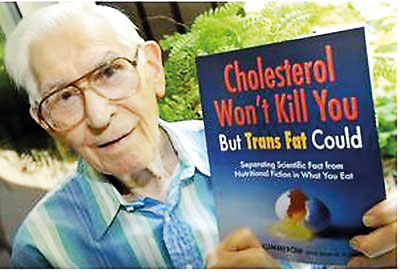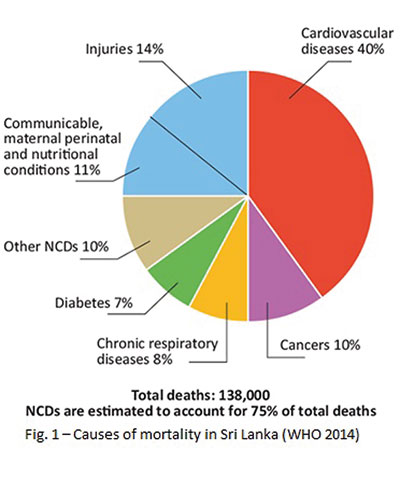Get rid of trans fats from our diet
View(s):“Why should our children have such an unsafe ingredient in their foods?” – Dr Tedros Adhanom Ghebreyesus, Director General of the WHO, asked when ‘REPLACE’, a step-by-step guide for the elimination of industrially-produced trans-fatty acids from the global food supply was released on May 14, 2018.
“Eliminating trans fats is key to protecting health and saving lives: WHO estimates that every year, trans fat intake leads to more than 500,000 deaths of people from cardiovascular disease.

Prof. Fred Kummerow: Lived to the ripe old age of 102
Industrially-produced trans fats are contained in hardened vegetable fats, such as margarine and ghee, and are often present in snack food, baked foods, and fried foods. Manufacturers often use them as they have a longer shelf life than other fats. But healthier alternatives can be used that would not affect taste or cost of food.
WHO calls on governments to use the Replace action package to eliminate industrially-produced trans-fatty acids from the food supply said Dr Ghebreyesus. Implementing the six strategic actions in the Replace package will help achieve the elimination of trans fat, and represent a major victory in the global fight against cardiovascular disease.
The six strategic actions to ensure the prompt, complete, and sustained elimination of industrially-produced trans fats from the food supply are:
REview dietary sources of industrially-produced trans fats and the landscape for required policy change.
Promote the replacement of industrially-produced trans fats with healthier fats and oils.
Legislate or enact regulatory actions to eliminate industrially-produced trans fats.
Assess and monitor trans fats content in the food supply and changes in trans fat consumption in the population.
Create awareness of the negative health impact of trans fats among policy makers, producers, suppliers, and the public.
Enforce compliance of policies and regulations.
Several high-income countries have virtually eliminated industrially-produced trans fats through legally imposed limits on the amount that can be contained in packaged food. Some governments have implemented nationwide bans on partially hydrogenated oils, the main source of industrially-produced trans fats.
Situation in Sri Lanka
Graph 1 indicates that 40% and the highest number of all deaths in Sri Lanka are due to cardiovascular diseases (CVDs). Dr. Rohan Gunawardena, Consultant Cardiac Electrophysiologist, National Hospital, Colombo has clearly explained the situation in ‘Looking after your heart: Start young’ by Kumudini Hettiarachchi in MediScene published on September 16, 2016. He states;
- “Prevention is better than cure. It is the need of the hour, rather than awaiting heart disease and then taking medications lifelong to keep it under control, but never being able to cure it”.
- “Catch them young and teach them all about healthy lifestyles”.
- “A majority of people being struck down by heart disease then were 50 years old or above, but gradually we have seen it hitting those between 40 and 50 and then 30 and 40. These are peak years in a person’s life when he/she is the breadwinner and have young families. The other important factor is that more and more women also seem to be vulnerable to coronary artery disease.”
- “Nearly 60-80% of coronary artery disease can and should be prevented. The time for prevention is childhood, for the initial lesions in the arteries start occurring then. From the time we are born and into our early teens, depending on our lifestyle, slowly, gradually and insidiously atherosclerosis would begin to affect our arteries.”
The situation with regard to CVDs in Sri Lanka has reached epidemic proportions and has been in this unenviable position for two decades.
Prof. Fred Kummerow
 Prof. Fred Kummerow at the age of 98 sued the US, FDA and the Department of Health and Human Services in 2013 to make known the dangers of trans-fats. In the 1950s, Kummerow persuaded a local hospital to let him examine the arteries of people who had died from heart disease. He was startled to find that the tissue contained high levels of artificial trans-fat, a substance that had been discovered decades earlier but had become ubiquitous in processed foods throughout the country. Prof. Kummerow died at the age of 102 but, lived long enough to know that his nearly six decade long lone crusade to get industrial trans-fats banned in the US had been successful.
Prof. Fred Kummerow at the age of 98 sued the US, FDA and the Department of Health and Human Services in 2013 to make known the dangers of trans-fats. In the 1950s, Kummerow persuaded a local hospital to let him examine the arteries of people who had died from heart disease. He was startled to find that the tissue contained high levels of artificial trans-fat, a substance that had been discovered decades earlier but had become ubiquitous in processed foods throughout the country. Prof. Kummerow died at the age of 102 but, lived long enough to know that his nearly six decade long lone crusade to get industrial trans-fats banned in the US had been successful.
Kummerow never was convinced that cholesterol was a major factor in heart disease. Into his 100s, he ate eggs and drank whole milk. He avoided french fries, margarine and other fried foods. He died aged 102.
So why should Sri Lankans tolerate industrial trans-fats in their foods when the WHO is urging the elimination of industrial trans-fats from food and the better solution is to reduce CVDs is prevention. The wisest method to be adopted is to prevent it rather than waiting to cure it.
A substitute for partially hydrogenated oils should be produced. Such a commodity is Pentadesma fat extracted from the oil rich seeds of the species, Pentadesma butyracea (African Butter Tree) and its value added products. This species is found in the forests of many countries in the tropical West African Region.
This species is suitable for establishment in tropical and sub-tropical regions and can remain productive for well over a century, producing edible fruits, oil-rich seeds, and ultimately good quality timber. Pentadesma fat is very low in linoleic, but high in both oleic and stearic fatty acids. This vegetable fat is a substitute for cocoa butter.
This evergreen and perennial species could diversify the uneconomical tea and rubber giving multiple benefits to Sri Lanka.
For additional information, see ‘Transfats: an “invisible danger” in Sri Lanka?’ published in September 2018 issue of INFORM the magazine of the American Oil Chemists’ Society.
| Two main sources of trans fats There are two main sources for trans fats: natural sources (in the dairy products and meat of ruminants such as cows and sheep) and industrially-produced sources (partially hydrogenated oils). Partially hydrogenated oils were first introduced into the food supply in the early 20th century as a replacement for butter, and became more popular in the 1950s – 1970s with the discovery of the negative health impacts of saturated fatty acids. Partially hydrogenated oils are primarily used for deep frying and as an ingredient in baked goods; they can be replaced in both. WHO recommends that the total trans fat intake be limited to less than 1% of total energy intake, which translates to less than 2.2 g/day with a 2,000-calorie diet. Trans fats increases levels of LDL-cholesterol, a well-accepted biomarker for cardiovascular disease risk, and decreases levels of HDL-cholesterol, which carry away cholesterol from arteries and transport it to the liver, that secretes it into the bile. Diets high in trans fat increase heart disease risk by 21% and deaths by 28%. Replacing trans fats with unsaturated fatty acids decreases the risk of heart disease, in part, by ameliorating the negative effects of trans fats on blood lipids. In addition, there are indications that trans fat may increase inflammation and endothelial dysfunction”. (Refer – ‘WHO plan to eliminate industrially-produced trans-fatty acids from global food supply’. Link – https://www.who.int/news-room/detail/14-05-2018-who-plan-to-eliminate-industrially-produced-trans-fatty-acids-from-global-food-supply) | |
( The writer is an Associate of International Food Science Centre, Denmark)


